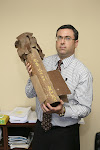JERUSALEM — There are no empty beds this day in the recovery room at the Hadassah-Ein Kerem hospital. Doctors and nurses hover over patients. Manar Igbarya, 25, is giving a woman an injection and inspecting a bandage on her right leg. The Orthodox patient is absorbed in talking to her visiting husband. Everyone is chatting in Hebrew; nothing in this scene seems unusual, except that Ms. Igbarya is a Palestinian Muslim.
Muna al-Ayan, 22, who works as a secretary in the same hospital, wears a hijab; everyone recognizes her as a Muslim. She said it had been hard for her to find a job in the past because of that, but she was accepted at the hospital because “all they cared about was how I do my job.” Every so often, she said, smiling, a patient is surprised to see a Muslim working here.
Ashgan, 35, who asked not to be identified by her family name, works in the operating room as a nurse. “We all speak Hebrew, and all we do here is our job, though we all carry our Palestinian identity inside us,” she said, looking at the other two women. “No one can forget their identity.”
While more traditional Palestinian women marry in their early 20s, the members of this trio are all single. Each of them characterized the world inside the hospital as very different from that outside its walls, where Arab and Jewish Israelis live -- at least in some places -- side by side but barely interact.
“We are a team here, and there is no difference, if one is Jewish or Muslim or Christian: The task is to help the patients,” Ms. Igbarya said. Sometimes, she said, she glimpses questions in the eyes of some Jewish patients if they hear her speaking Arabic to Ms. Ayan or to Ashgan.
There is a tension to Jerusalem even more intense than in other parts of Israel, in part because the city itself is a key source of dispute, important as it is to the religion of both Jews and Muslims.
“People in Jerusalem from both sides are very difficult, and there is a lot of anger,” Ashgan said. “The conflict is influencing all our lives directly here. We are not living in dreamland.”
Ms. Ayan lives with her parents in a mixed neighborhood in Jerusalem. Their next-door neighbor is Jewish, and Ms. Ayan said her father used to be friends with him until the second intifada broke out in 2000. “Then his son started throwing stones at our door, because we were Muslim,” she said, adding that sometimes opinions vary within families on either side.
Arabs and Jews work together in other places in Israel, but Hadassah hospital is one of the few places where they confront the bloody side of conflict, immediately and together. Both sides admit that this is not easy.
In some cases, Muslim nurses treat Israeli soldiers wounded in fights with Palestinians while their Jewish colleagues also attend to Palestinians who attacked Jews. “This is a learning process for all of us,” Ashgan said, “but we treat first the patient, and then maybe later we hear what the story was.”
It is the hospital’s policy to treat patients equally regardless of their religious or ethnic background. Founded by Hadassah, the Women’s Zionist Organization of America , in 1961 in the southwest of Jerusalem, Hadassah-Ein Kerem is one of the largest medical complexes in Israel. Another campus, called Hadassah Mount Scopus, was founded in 1939 in the northeast part of Jerusalem.
The hospital is the scene of interactions hard to experience outside its walls. Avichayil Hindi, 19, for example, calls herself an “Orthodox Jewish girl” who grew up in a settlement with no Arabs. She came to the hospital in September to fulfill her national service requirement, choosing a social role rather than serving in the military as most young Israelis do. “I had never been in touch with Arab people before,” she said. “Before I came here, I thought Arabs are bad people who only want to attack and kill Jews.”
Since she began working at the hospital, she and Ms. Ayan have become friends who go for coffee or lunch in the cafeteria together. “I have learned here that Arabs also have families, and I learned what their perspective of this conflict is,” Ms. Hindi said.
Even with such insights, there appears to be little common view of the possible solution to the Israeli-Palestinian conflict. Asked what they thought, the three Arab women said the only solution would be a two-state solution.
Ms. Hindi, by contrast, said “there is no solution,” and certainly not one that requires Jews to give up land.
The popular revolts of the Arab Spring, the question of how the world would react if those revolts reached Palestinian areas, the uncertainty of the outcome in an ever-more violent Syria, and the future attitude of Egypt under President Mohamed Morsi all weighed on their minds.
Indeed, all four women noted that their contact was possible only because the hospital’s leadership made it so clear that there was to be no discrimination among patients or staff. “As long as we keep politics out of it,” said Ashgan, “all is good.”

